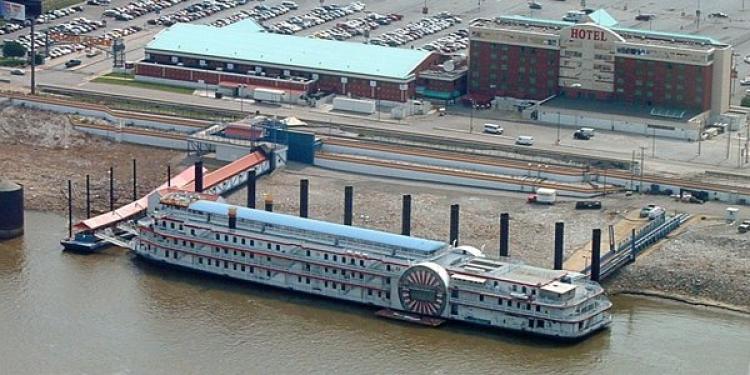Riverboat Casinos Could Be Sunk
Posted: September 29, 2014
Updated: June 4, 2017

As Indiana’s riverboat casinos face increasing competition from surrounding states the Interim Study Committee On Public Policy rides to the rescue… or does it?
As the march of legalized gambling begins to spread out across the US (23 states and counting) those states that were ahead of the game are looking for ways in which to remain competitive in the face of ever greater numbers of alternatives. Indiana’s repeal of an anti-lottery law in 1988 was seen as a license for the legislature to pick and choose which forms of gambling should and should not be provided to citizens of the state. This began slowly with 1989s legislation providing a legal frame work for both live horse race betting and a lottery, expanding to off-course betting three years later, and just a year after that gambling on riverboat casinos.
Indiana’s Riverboats Face Choppy Waters Ahead
• Increased competition from Michigan and Ohio
• Gambling news isn’t good for riverboat casinos
• Tax reform may be one solution
These laws have been tweaked and twisted a little over the years, riverboats can now have gambling 23 hours a day even at the dockside, for instance, but as time moved on so did the laws. Legalized slot machines at the state’s two race tracks in 2007 and a year later small stakes gambling on the pull-tabs common in bars across the state and popular with those that live there. The 1993 riverboat gambling law allowed for five riverboat casinos, but these have been augmented since with additional vessels.
The riverboat casinos generate large revenues for the state given there are two taxes upon them, both an admission tax, $3 per person, plus the wagering tax that takes a flat rate percentage of casino win, although after the 2002 ruling on dockside gambling a sliding scale was introduced that meant up to $25 million it was just 15%, growing to 30% for over $75 million, and 40% for $600 million or more. Over the years the riverboats have paid up close to $6bn in taxes, and so keeping that revenue stream alive and well is of quite some importance.
As well as the threat of online gambling sites in the US becoming an unstoppably prevailing tide, and the adjacent states that have either already developed a gaming industry or are taking the steps necessary to put the legal framework in place to create one, Indiana suffers from a slight issue when it comes to the framework it has allowed to develop. The piecemeal manner in which gaming laws have evolved in Indiana has left it bereft of live dealers in some casinos. Most particularly those at the racetracks where slots are legal but table games aren’t.
Committee Wants Solutions
The “Interim Study Committee On Public Policy” has been tasked with finding ways to keep casinos more competitive in Indiana, as their catchment area is shrunk by the competition from Michigan, Illinois, and Ohio. They may be a little late, certainly their membership seems in no doubt that something needs to be done immediately to alleviate this problem before it gets as bad as the spectre of Atlantic City.
“Time is of the essence at this point.” Said State Senator Tim Lanane. “We should have probably done something sooner but we need to find some common-sense solutions to this problem.” Which is frankly not quite as useful as actually having some of the common-sense solutions needed to actually solve the problem. State Senator Jack Lutz also felt it necessary to wring his hands about the timing “This is a lot of the same information we’ve had and I think we’ve waited a little long to do something. We’re being reactive to the competition as opposed to proactive.”
The “it’s a bit late now” tone isn’t helping casino bosses feel reassured as they watch revenues fall across the state as newer competitors in nearby states roll out better facilities with more attractions to pull in the punters. Ohio in particular is dragging away Indiana’s market and that’s showing in the bottom line. Money is mobile betting money doubly so and right now it’s going to play somewhere else and the committee’s sorrowful lack of meaningful solutions is unlikely to stop that flow away from the pockets and tax revenues of Indiana.
The Committee then faces a bit of a hill to climb at this late stage and it is perhaps for this reason that they have been willing to entertain the proposals from within the industry that, pretty much, center around an expansion of current service and opportunity provision by entities both on the water and off it. The riverboats may well face some pressure but their inherent attraction means that they too are competition from the state’s two “racinos” where horse racing and slot machines are both legal forms of gambling.
Racinos Want Live Dealers
Jim Brown, CEO of Centaur Gaming which runs the racinos pointed out to the committee in an appearance before them that the introduction of a live dealer to games like blackjack and poker (the natural home for dealers) which are currently only permitted in digital form, is not really an expansion of gambling at all. Although that might well be a hollow claim, and one the committee might accept as being technically true whilst at the same time hardly within the spirit of the law as it was intended at the time. Up against it they might just have to take his word for it.
“We’re operating in the same footprint.” He explained. “We’re not adding tables, we’re just replacing a computer chip with a human being.” Which may or may not play well with the State Senators (many of whom could be replaced with a computer chip themselves). What will play well is the 600 jobs promised by live dealing being introduced at the two trackside locations. Some communities have been hard hit by the increase in competition, far more than some others, and these locales will need assistance to weather the storm.
Internet betting in the US is still in its infancy but the legalization of this segment of the gambling market is likely to see even greater pressures placed on Indiana’s somewhat “old world” charm as gamblers are sucked away into the cyberverse’s endless quantities of opportunities and bonuses. In essence things are only going to get worse before they get better and the committee is probably all too well aware of this with a degree of fatalism working into the narrative coming out of the officials concerned.
Tom Dermody, who is chairing the committee, has said he wanted all members of the committee to arrive at the next meeting with ideas for how to help the casino industry from live gaming, to land-based gaming, to even the holy grail of casinos bosses, a friendlier tax regime. All of which sounds positive and hopeful, but you can’t help thinking the committee could probably have guessed all that already and should perhaps have come up with “ideas” a couple of years ago. “I’m cautiously optimistic,” Terri Austin said. “We’ve got people representing the racinos and riverboats and hopefully we’ll be able to take the lead and make sure no one suffers any harm.” Which could be a victory of optimism over reality if ever there was one.












